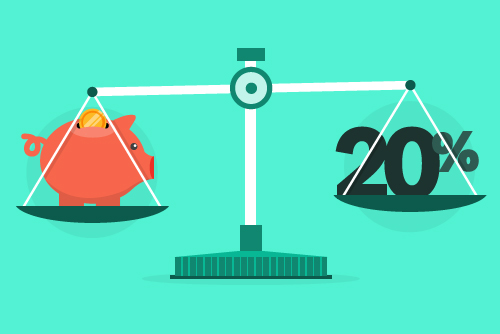How to Buy a Home Even if You Have Bad Credit

Protect your credit score by reviewing it for mistakes, so you'll be ready to start the home buying process when you find a place you love.

Experts Answer Your Top Questions About Buying a Home With Bad Credit
Your credit score is one of the crucial determining factors in whether you can qualify for a mortgage. “The higher your score, the less risky you appear on paper,” says Staci Titsworth, a regional manager at PNC Mortgage in Pittsburgh, PA. If that sends shivers up your spine, keep reading. We’re here to help.
The reality is that the average U.S. household has over $15,000 in credit card debt. You’re not alone if you’re wondering: Can I even try buying a home with bad credit? The answer is yes, but for a smooth home-buying journey, you’ll want to take care of any financial blips on your report now. Here we share expert answers to your questions, including exactly what a credit report is and how to raise your score to get ready to buy a house.
What exactly is a credit score?
It’s common practice for mortgage lenders to check your credit score, which is calculated based on the information that appears on your credit report. Five aspects impact your score, each varying in importance: payment history (35%), debt-to-credit utilization (30%), length of credit history (15%), credit mix (10%), and new credit (10%). A quick primer:
Payment history. You need to make payments on time, since one late payment can significantly ding your score. One example: A 30-day delinquency can cause as much as a 90- to 110-point drop on a score of 780 for a consumer who has never missed a payment before, according to Equifax.
Debt-to-credit utilization ratio. This is how much debt you’ve accumulated on your credit cards divided by the credit limit on the sum of your accounts. Credit experts recommend keeping this ratio around 30%. If you’re maxing out your credit cards each month, you could be damaging your credit score in the process.
Length of credit history. Having a longer credit history raises your score. Since credit agencies look at the age of your oldest account, the age of your newest account, and the average age of all your accounts, you should keep all of your accounts open—even those with zero balances, says credit expert Bill Hardekopf.
Credit mix. It helps your score to have a combination of different types of credit accounts, including credit cards, retail accounts, installment loans, car loans, and mortgage loans. (You’re on your way to getting the last one.)
New credit. Each time you apply for a new credit account, you trigger a “hard inquiry” on your credit, which dings your score (typically by five points). Therefore, avoid opening multiple credit accounts at the same time, says Hardekopf. Doing so will lower the average age of your credit accounts and hurt the length of your credit history.
Caveat: Your credit report doesn’t contain your actual credit score. However, your credit card company can most likely provide your score to you for free, or you can contact a nonprofit credit counselor to find out your score.
What is an ideal credit score?
A perfect credit score is 850, but only about 0.5% of consumers reach that number, according to Fair Isaac Corporation, creator of the widely used FICO credit scores. Once you’re over 740, you’re considered to be in the best range for mortgages and should be able to qualify for the best interest rates, says Chris Hauber, a mortgage loan originator with Hallmark Home Mortgage in Denver, CO.
If your score is in the 700s, you should still be able to qualify for an attractive interest rate. For conventional loans, most lenders look for a credit score of at least 620, says Hauber. At a minimum, applicants should have at least a 660 credit score to land a decent interest rate and avoid jumping through additional hoops to qualify for a loan.
Can I get a mortgage if I don’t have a credit history?
Ideally, you opened a credit card account by age 20—or at least started to build credit by becoming an authorized user on your parents’ card when you were a teenager. (Remember, the length of your credit history plays a major role in how your score is calculated.) But if you don’t have any credit established, there are other ways to qualify for a mortgage and establish a credit history. “Many lenders will look at monthly payment obligations that don’t necessarily show up on a person’s credit report,” says Titsworth. If you have a good track record of making your car loan payments and paying rent on time, that will help, say experts. Those habits are usually indicative of a responsible credit user.
Is bad credit worse than no credit?
No one’s perfect and mistakes happen. Maybe you forgot to pay the minimum balance on your credit card bill once or twice—or you recently met with a mortgage lender to discuss your financing options and discovered errors on your credit report. Whatever the case may be, you can always take steps to heal your credit. “Poor credit can be managed,” Titsworth points out.
Moreover, there are loan programs designed to help people with mediocre credit buy a home. Federal Housing Administration (FHA) loans have some of the lowest credit-score requirements at 580 with a 3.5% down payment. Loans backed by the Department of Veterans Affairs let military veterans put as little as 0% down on a property without having to pay private mortgage insurance.
How can I boost my credit score before I buy a home?
To get your three-digit number up to snuff, start by addressing the financial habits that damaged your score in the first place.
Pay all of your bills on time each month. Sounds tough, but it is the easiest way to boost your score, says Hardekopf. If you need help adjusting your spending habits and designing a budget that makes sense for you, consider meeting with a financial planner (you can find one at NAPFA.org).
Pay down your credit card debt. Since credit scores are often the result of having a high debt-to-credit utilization ratio, one of the best ways to improve your score is to get rid of existing debt, says Hauber. Many experts use the 30% rule of thumb: Charges to your credit cards shouldn’t exceed one-third of your total available credit limit. You may also be able to raise your score by requesting a credit line increase from your credit card issuer; this would effectively reduce your debt-to-credit utilization ratio. It typically involves just making a phone call or submitting a request online.
Get Help with Your Home Loan
Have more questions about buying a home? Find a local lender who can help.
What if I notice errors on my credit report?
Carefully review your credit reports for errors. You’re entitled to a free copy of your credit report every 12 months from each of the three major credit-reporting agencies (Equifax, TransUnion, and Experian). One in four Americans said they spotted errors on their reports, according to a 2013 Federal Trade Commission survey. The mistake may be something as simple as someone else sharing the same name as you and your bank mixing up your accounts, says Sylvia Gutierrez, a loan officer in South Florida and author of Mortgage Matters: Demystifying the Loan Approval Maze.
If you spot an error, alert your creditor immediately. Once your creditor confirms the error, the company will submit a letter to Equifax, TransUnion, and Experian individually to get the error removed. If the error is just on one bureau’s report (like a misspelled last name), contact that agency specifically to rectify the problem. Hopefully, you spotted it early in the home-buying process, since “it can take time to get errors removed from your report,” says Titsworth. If you’re already in the process of purchasing a home, ask your loan officer to help you speed up the error removal.
Can I get black marks removed from my report?
If you’re the one responsible for blemishes on your report, such as a missed payment, contact your creditor and ask for a deletion. While this likely won’t work for a serial late payer, it might be granted if you’re a one-time offender; it also helps if you’ve been a loyal customer. If the creditor agrees to the deletion, they’ll send letters to the credit bureaus (the same way they do for errors) requesting that the negative information is removed from your report. Then the onus is on you to gather documents proving that changes that have been made—such as a new credit card statement or letter of deletion—and then have your lender request an updated score from the credit bureaus. This process is often referred to as a “rapid rescore” and can lead to an updated credit score in days instead of months, which can make all the difference when you’re trying to get preapproved for a home loan in a competitive market.
Should I get help from a credit-counseling agency?
First, you need to understand the difference between a credit-counseling agency and a debt-management company. If you’ve fallen behind on credit card payments, a credit counselor can help you create a plan to pay back your creditors and better manage your money for a relatively low cost. A debt-management company, meanwhile, will negotiate with your creditors to try to reduce the amount of debt you owe—but many debt-management companies charge a large fee for their services.
Unless you’re seriously in the hole, a debt-management company probably isn’t the way to go. Whether you should meet with a credit counselor, meanwhile, depends on how complicated your financial situation is and what kind of guidance you want. If you have debt on only one credit card and simply have to pay off the balance, you already know what you have to do to mend your credit score. If the situation is more complicated (e.g., you owe money on several credit accounts and don’t know which to pay off first), a session with a credit counselor may help you devise a payoff plan. Some nonprofits, like the Consumer Credit Counseling Service, offer free consultations.
What interest rate will I get with my low credit score?
Of course you can talk to a lender to see what rate you may qualify for. But if you’re not quite ready to talk to a lender, you can use Trulia’s mortgage rates tool to get free rate quotes and compare rates from multiple lenders, anonymously. Simply enter your credit score along with zip code, purchase price and down payment, and you’ll get the latest rate quotes from up to 100+ lenders, instantly. You can even estimate much savings you’ll get by boosting your credit score. Simply update the credit score to get updated rate quotes for that scenario. Remember, the interest rate you’ll get depends on many different factors, not just your credit score.
Originally published June 13, 2016. Updated December 13, 2017.
Have you recently gotten a copy of your credit report? Share your experience in the comments.
![]()
Denise Brodey
Related articles and tips

4 Ways for Homeowners to Restart Saving
Ready to get back in the savings game? Start with these 4 tips.

Is It Smart To Buy A Home With Less Than 20% Down Payment?
Here are some items to consider before taking on one of the new, low-down-payment loans on the market.

7 Life Changes That Could Help Your Finances
Help improve your economic situation with these strategic solutions.

Want a Fixer-Upper? This Mortgage Is for You
If you’ve found your dream home (but it’s in need of some TLC), consider one of these loans.
Share your comments
Find Homes on the Go
Trulia's top-rated mobile app shows homes for sale near you—anytime, anywhere.